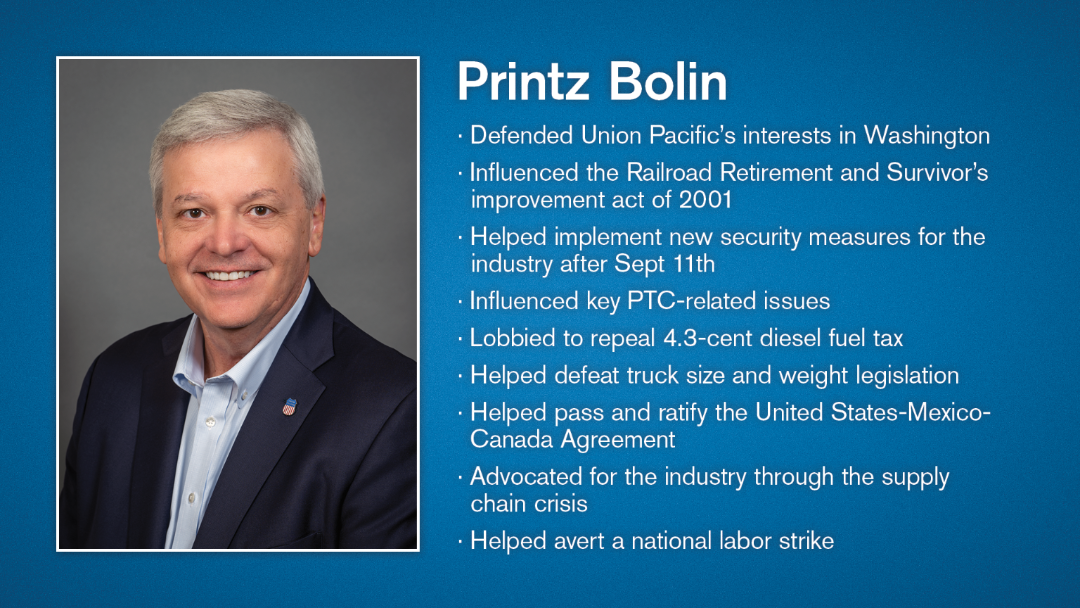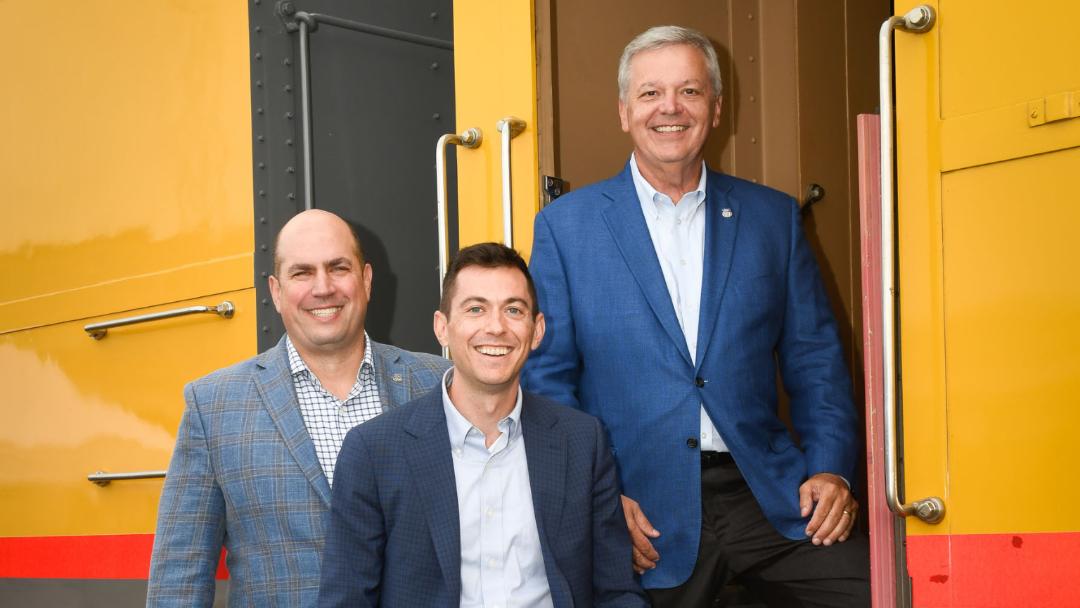Throughout his career representing Union Pacific on Capitol Hill leading the railroad’s External Relations team, Printz Bolin has split his life between two very different worlds.
On one hand there was Washington, D.C., a gritty urban landscape populated by briefcase-carrying career politicians in thousand-dollar power suits who crowd sidewalks with cellphones forever stuck to their ears.
On the other hand, there’s Bolin’s hometown of Oxford, Mississippi, population 26,000, located on sleepy highway 278 between Memphis and Tupelo, where one of the biggest attractions is a double-decker tour bus that symbolizes the English city that is its namesake.
Subscribe to Inside Track
For the past few years while Congress was in session, Bolin had his share of power lunches with lawmakers and trading in his business suits for a pair of well-worn Carhartts so he could return to Oxford and tinker with his tractors and take care of his collection of Guinea hens, turkeys, donkeys and hybrid bass that live on his rural family farm.
But instead, Bolin and his Washington office have spent the last few years negotiating with federal regulators as the industry has faced one challenge after another. Among them, the COVID-19 pandemic in 2020 followed by the supply chain meltdown of ’21; a highly contentious collective bargaining agreement that almost led to a labor strike in ’22; and the East Palestine, Ohio, derailment that impacted the entire industry and spawned the Railway Safety Act of 2023, a bill currently under consideration in Congress. With all that on the line, there was no time to retire.
With his dry wit, slight twang and knack for listening first and asking tough questions later, Bolin remained the perennial Southern gentleman. Hailing from the small town of Brooksville, Mississippi, he graduated from the University of Mississippi – or Ole Miss as it’s more commonly known – in 1982 and took his first job in politics working for Mississippi Congressman Trent Lott. After working on Lott’s successful campaign for U.S. Senate in 1988, Bolin was appointed the senator’s Chief of Staff.
“Printz knew the state very, very well,” said Sen. Lott. “But the main characteristic that Printz had - and has to this day - is I trusted him. I knew he would try to do the best he could for me, and I knew he’d be loyal, and the rest would take care of itself.”
But not always, as Sen. Lott humorously recalled. “Mississippi Congressman Bill Colmer had these beautiful old, rollback round black chairs, and I wanted to take those chairs with me to the Senate,” Sen. Lott said. “So, one night, Printz (along with a couple staffers) went over to the House side and got two of those chairs and rolled 'em over to the Senate side.”
The caper backfired. Bolin and his compatriots were caught and ended up rolling the chairs right back to the House side of the building.
“But the most humorous story was Printz being able to convince (Bolin’s wife) Kimberly to marry him,” Sen. Lott said. “She was working in Mississippi Congressman Sonny Montgomery's office, and they started dating. And boy, I thought he was really kicking over his head, but that was an important move.”

Another important move took place after Bolin began dealing with hazardous material disposal issues in Mississippi – a task that made him familiar with the rail industry and put him in touch with Union Pacific. In 1991, Bolin left public life and entered the private sector, taking a position at Union Pacific Corporation subsidiary USPCI, which would lead to a job at Union Pacific Resources in 1995 before he finally landed at Union Pacific Railroad in 2001 as director of Washington Affairs.
“The story goes that upon being offered the railroad position, Bolin said: ‘You’ve shut down two subsidiaries I’ve worked at so far. Now I’m going for the mothership,’” recalls David Black, who was among those who welcomed Bolin to the Washington office.
Bolin would hit the ground running his first year with the railroad, becoming part of the Union Pacific team that influenced the Railroad Retirement and Survivors’ Improvement Act of 2001, “a landmark piece of legislation that brought together labor, management and regulators to increase benefits for railroaders and their beneficiaries,” said Scott Moore, retired senior vice president of Corporate Relations and Chief Administrative officer.
That same year, Bolin and the Washington team worked with federal regulators as they implemented new transportation security measures following the Sept. 11 attack on the United States. Another critical effort in those early years was lobbying Congress to repeal the 4.3-cent diesel fuel tax that had a major financial impact on the rail industry, saving Union Pacific $60 million annually.
Bolin’s ability to always get in touch with lawmakers was a key factor to their effectiveness, said Andrew Brady, who worked with Bolin as assistant vice president-External Affairs. “Printz has more than two dozen cell phone numbers for U.S. Senators who know how to screen calls,” Brady said, “but they always pick up when they see it’s Printz. His network of direct connections – and those of the team he built – kept things moving.”
Bolin was promoted to assistant vice president-External Relations in December 2007. A year later, the Railroad Safety Improvement Act mandated implementation of Positive Train Control (PTC) systems on Class I railroads’ main lines. Despite the fact that the technology to make the system work was still on the drawing table, railroads were under pressure to implement PTC at a break-neck pace.
As the initial deadline approached, Bolin and the Washington office were part of a rail industry effort to “manage the mandate” and lobbied for passage of legislation that extended the PTC implementation deadline – a huge, necessary lift if the railroads were to keep the nation’s products moving, said retired Union Pacific Chairman Lance Fritz.
“Printz had a deft hand when working with Congress,” Fritz said, “particularly working with staff on committees of jurisdiction that matter deeply to us. He was really good at strategically engaging with those staff, senators and representatives at the right moment with the right touch, making sure we were positioned to get things done.”
Fellow assistant vice president, Wes Lujan agreed, adding that Printz was the ultimate referee. “He honed that skill having refereed high school basketball games in Northern Virginia for many years,” Lujan said. “He enjoys an intense game and being in the mix, always balancing his arguments with his dry, witty humor.”
Ian Jefferies, president and CEO of the Association of American Railroads, recalled long nights side-by-side with Bolin counting votes and making calls to defeat truck size and weight legislation that would have allowed potentially dangerous 91,000-pound trucks on U.S. highways.
“You never know what's going to be coming at you, and you have to be prepared to learn quickly and adjust on the fly to mobilize and communicate,” Jefferies said. “And that's one thing our industry -- and Printz in particular -- has been really good at over the long haul. He’s become a trusted entity with the Hill and demonstrated his honesty, clarity and objectivity, developing credibility and respect representing Union Pacific.”
Throughout his career, all agree Bolin’s best tool was that unique Southern charm born from his Mississippi roots.
“There's a certain style of communication that you run across in the South that allows you to say things that are deeply impactful in a way that doesn't offend,” Fritz said. “Printz is good at that. That's a skill.”






